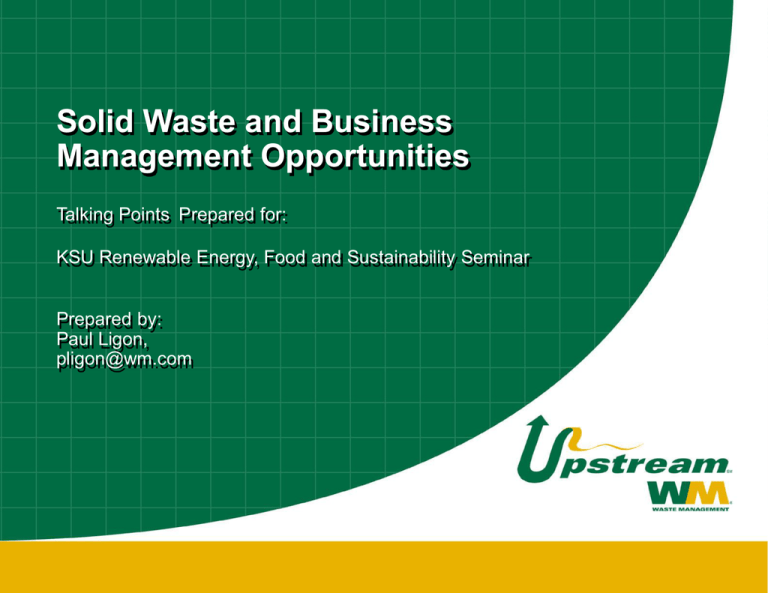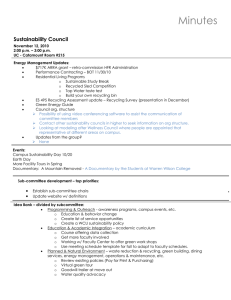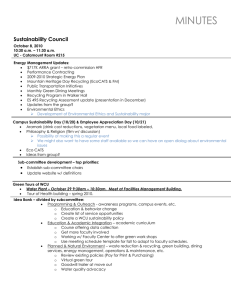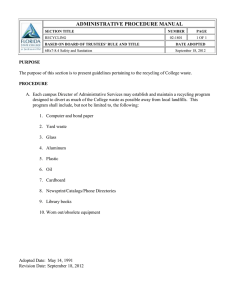Solid Waste and Business Management Opportunities
advertisement

Solid Waste and Business Management Opportunities Talking Points Prepared for: KSU Renewable Energy, Food and Sustainability Seminar Prepared by: Paul Ligon, pligon@wm.com Personal Profile • 1986-1990, University of Vermont – Vermont Student Environmental Program • 1990-2001, Tellus Institute – Business and Sustainability & Sustainable Community Groups – Select clients: EPA, United Nations, Global Reporting Initiative, various businesses and municipalities • 2001-2003, Tuck School of Business at Dartmouth – Tuck Biz and Sustainability Initiative • 2003-Present, WMI Upstream – Director, Biz Dev and Strategy – Select customers: diversified manufacturers, food & beverage companies, cruise lines, pipelines, petrochemical, automotive companies. Talking Points • WMI at a Glance • From Waste to Resource Management: Business Sustainability Trends • Upstream Business Sustainability Services, Solutions, and Case Studies WM at a Glance • Fortune 200 company • Nearly 50,000 employees • Over 22 million residential and commercial customers • Most Extensive Environmental Asset Base in North America: – Largest recycler in North America with nearly 120 facilities – 25,000 collection and transfer vehicles – 285 landfills – 17 waste-to-energy plants – Upstream Services WM Sustainability Highlights • Recycling assets and commitments – Largest recycler in North America ~ over 6MM tons recycled annually – Preventing the release of more than 3.4 million metric tons of greenhouse gas emissions – Triple current recycle rates by 2020 • Renewable energy assets and commitments – – – – • Largest national network of resource recovery facilities Over 100 renewable energy projects throughout North America Enough to power over 1MM homes Double renewable power generation by 2020 Other initiatives and commitments – Largest fleet of alternative fuel trucks in the nation (415 vehicles); increasing fleet wide fuel efficiency and decreasing emissions 15% by 2020. – Provide protected land for wildlife habitats; quadruple - from 24 to 100 - Wildlife Habitat Council certification sites and set asides. – Upstream and organic growth green innovations and investments Sustainability is a business imperative… Why are leading US companies pursuing sustainability? • Reduce operating costs and improve efficiencies; • Develop innovative products and services for access to new markets; • Improve reputation and brand value; • Recruit and retain excellent people; • Gain better access to investor capital; • Enhance the public value of the company; • Reduce liabilities through integrated risk management. Source: KPMG International Survey of Corporate Responsibility Reporting. Business Trends Affecting Waste … • Zero Waste • Extended product responsibility • Closed loop recycling – cradle to cradle • Carbon reduction • LEEDs certification • Resource management A growing Number of Companies Have Moved from Waste to “Resource Management” WM Upstream Overview Customized Services Fully integrated offering that revolves around customer needs. Market Leader ~135 Sites Automotive Chemical Cruise Lines Food and Beverage Malls Pharmaceutical/R&D Refining Metals Energy Upstream provides resource management services to leading businesses that maximize economic, environmental, and regulatory efficiency. 280 + Employees Environmental Engineers / Project Managers / EH&S Staff / Business Development / Finance Cutting Edge Services • Managed solutions • ISO 14001 • World Class Safety • Best practice • Continuous improvements • Access to the largest enviro network in the US WM-Upstream Capabilities Help Businesses Achieve Sustainability Goals Sustainability Strategy Managed Solutions Customized Programs Environmental Management Systems Indemnification Strategic Sourcing Upstream Capabilities IT = Web Ordering, Tracking & Metrics Logistics Customized Services & Expertise Environmental Assets Financial Stability Achievement of Green Goals Total Cost Reduction Long Term Value Waste Flow from Industry Value Chains R&D, Purchasing, SG&A Inbound Logistics Waste Product Formulation/ Production Waste Outbound Logistics Waste Wholesale Distribution Retail Channels Waste Waste IT, Reporting, Internal Material Handling, Storage, Training, Transport/Logistics, Compliance Waste Environmental Assets: T&D, Recycle, Composting, Incineration, Treatment, etc • Service providers: internal staff; brokers; consultants; logistics; maintenance and janitorial contractors; industrial cleaning, T&D companies • Fragmented offering – many players, duplicative processes and procedures, high transaction costs Aligned Incentives Drive Resource Management Success Commodity Offer: Conflicting Incentives SERVICE PROVIDER CUSTOMER Resource Management: Aligned Incentives UPSTREAM Service: Disposal Fee Driver: Volume Wants service increase CUSTOMER Service: Resource Mgmt Fee Driver: Value Wants service decrease Wants service increase Based on: Ligon and Votta, Tellus Institute. From Waste to Resource Management, 2003. Wants service increase Upstream Best Practice Savings Breakdown Total Savings > ~$40MM To Date Closing the Loop: RM Services for An Aluminum Manufacturer • Savings of over $1.43 M over 3 years • Material Re-use – Clean-up debris & aluminum waste – 1,550 tons re-used • Beneficial Use – Carbon, brick & ore – 2,000 tons recycled • Reclamation of Materials – Methyl Naphthalene, caustic liquids & antifreeze • Increased Recycling rates – East Plant – West Plant 2.0% - 76% 0.3% - 86% • Recycling Revenues now Exceed Waste Costs Direct Reuse of Clean-Up Debris • Designed screening system to allow alumina to be recovered and reused • Cost savings realized in disposal cost avoidance and recovered material cost • Estimated Annual Savings = $300,000 Resource Management Program Results at a Major Automotive Assembly Plant • Successfully implemented new operating model with 14 employees staggered over 2 shifts. • Identified award winning recycling innovations throughout all operations. • Annual savings of over $1 million. • Reduced total solid waste cost per vehicle by 91% (excluding labor) RM Services Drive Down Product Cost Total cost for Trash, Cardboard, and Pallets (including rebates) Cost per Vehicle $1.00 $0.80 $0.60 $0.40 $0.37 $0.25 $0.20 $0.06 $0.03 2005 2006 $0.00 2003 2004 Year Zero Waste Supply Chain Services for a Large Beverage Manufacturer • Created national network of certified full goods recycling outlets • Provide Order Management: Centralized service requisition – web, phone, fax, email • Single point of contact for full goods recycling scheduling, tracking, and support • Logistics support (e.g., transport and operations support) • Provide IT for scheduling, tracking and reporting Zero Waste National Beverage Recovery Network Zero Waste Supply Chain Results • Cost-effective recovery of all off-spec product – Includes liquid and packaging recycling • Enhanced management and logistics control – Reduces tracking and transactions costs – Reduced product liability • Enhanced value and reduced cost of service – 10% savings ’07 vs ’06 Closing the Retail Green Gap “America is experiencing an environmental awakening. However, a 'green gap' still exists between consumer awareness and action. Americans want to do the right thing, but lack of information, cost and questions around the true impact of current green products are contributing to their reluctance.” * * Kathy Sheehan, senior vice president with GfK Roper Consulting Green SM Squad Green SquadSM Service Offering Service Green Audit Green Services Certification LEED Status Waste Audits Offering in Ontario Energy Audits Development & Trial Water Audits Development Small Qty. Recycling Pilots in CA/TX Energy Conservation Pilots in CA Small Qty. Haz / Universal Pilots in TX LEED EB Certification Advanced Planning I Think Green Certification Advanced Planning LEED Project Services Advanced Planning 8-07 Closing thoughts… • Most environmental problems result from market and/or political failures… • Leading companies recognize that sustainability is a business imperative not a PR sideline… • Businesses will play a major role in addressing society’s sustainability challenges… • There are no waste streams, only wasted resources… Waste Management Recycle America 2006 Recycling Benefits 54,715,000 Barrels of Oil This provides enough energy to heat and cool more than 11,380,400 homes for one year! 136,102,800 Mature Trees This represents enough saved timber resources to produce more than 1.686 trillion sheets of newspaper! 33.687 Billion Kw-Hrs of Electricity This is enough power to fulfill the annual electricity needs of more than 2,807,000 homes! 30,282,500 Cubic Yards Of Landfill Airspace This represents enough airspace to fulfill the municipal waste disposal needs for 38,890,000 people for one year! In 2006, we recycled 6,047,449 tons of cardboard / paper; 1,214,959 tons of plastics; and 27,959 tons of aluminum. The recycling of this quantity of packaging and raw materials avoided their manufacturing and disposal, thereby conserving 1: Avoided 4,797,972 Metric Tons (MTCE) of GHG Emissions The recycling of these materials prevented these GHG emissions! 145,138,700 Gallons of Gasoline This represents enough gasoline to drive more than 4.064 billion miles! 42.332 Billion Gallons of Water This represents enough fresh water to meet the fresh water needs of more than 18,810,000 people for a month! 1 The environmental benefits shown here represent the difference in natural resource consumption and GHG emissions that result from using recycled inputs versus virgin inputs. MTCE = metric tons of carbon equivalent. Sources: U.S. Environmental Protection Agency, International Aluminum Institute, National Association for PET Container Resources, Institute of Scrap Recycling Industries, Earth Works Group Recycler’s Handbook, One Earth Recycle, National Recycling Coalition, and Waste Management. Copyright ©2000 by Waste Management, Inc. For Additional Info… • Paul Ligon – T: 281-914-7402 – E: pligon@wm.com • www.wmupstream.com – Links and related references – Case studies Thanks for your time!



